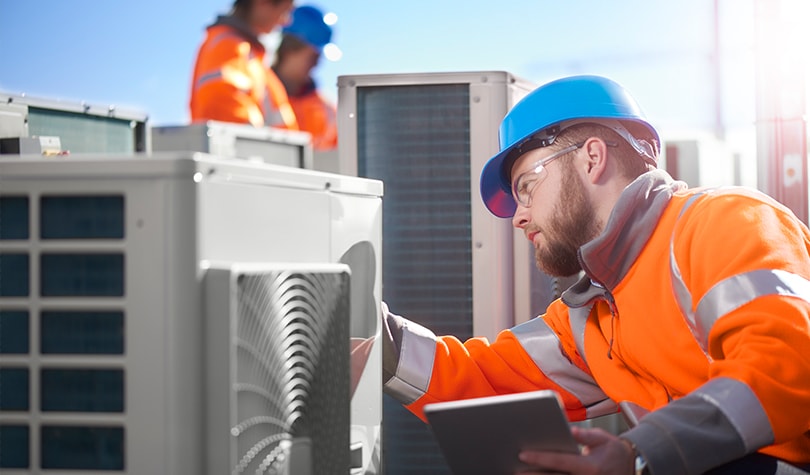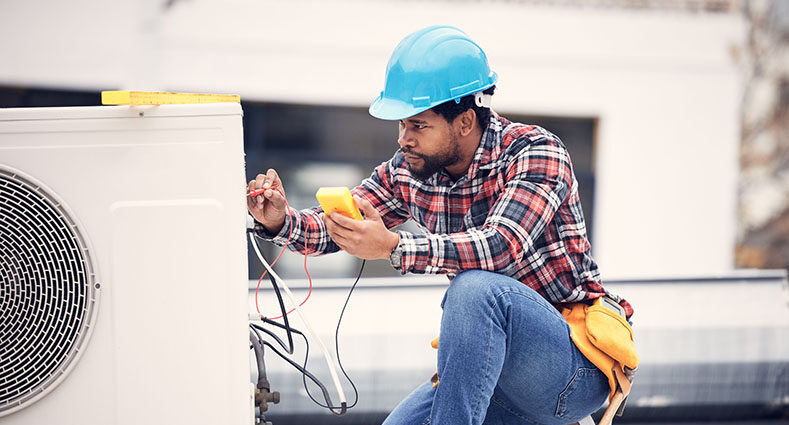HVAC company services explained: what homeowners should expect
The Significance of A/c Knowledge: Uncovering Sources Of AC Troubles for House Owners
Property owners usually overlook the significance of comprehending their HVAC systems. Recognizing common indications of cooling troubles can cause prompt interventions. Issues like insufficient cooling or uncommon sounds are not just aggravations; they can suggest deeper issues. By exploring the source of these troubles, house owners can enhance system efficiency and prolong its lifespan. What are the most common issues that can develop, and exactly how can they be properly addressed?
Common Signs of Air Conditioning Issues
How can house owners recognize concerns with their air conditioning systems before they rise? Recognizing typical signs of AC troubles is vital for timely upkeep. One widespread indicator wants cooling; if the air conditioning system fails to decrease the indoor temperature, it might signal underlying problems. Unusual sounds, such as grinding or hissing, can likewise show mechanical failures or loosened components - ac fix. Furthermore, home owners should watch out for unusual smells emanating from the unit, which may suggest mold and mildew development or electric troubles. Regular biking on and off, referred to as brief cycling, can indicate thermostat concerns or cooling agent leaks. A rise in power bills without an equivalent rise in usage might aim to inadequacy. By remaining alert to these warning indications, homeowners can prevent much more significant problems and pricey repair work, ensuring their cooling systems run successfully throughout the warmer months

Comprehending Refrigerant Issues
Refrigerant issues can greatly affect the effectiveness of a cooling and heating system. Property owners ought to know the signs of low cooling agent levels and the significance of identifying refrigerant leaks. Dealing with these issues without delay can avoid further damages to the system and assurance optimal cooling down efficiency.
Reduced Refrigerant Levels
A common issue that house owners might run into with their heating and cooling systems is low refrigerant degrees, which can considerably influence the system's efficiency and performance. Cooling agent is crucial for the cooling procedure, taking in warmth from indoor air and releasing it outside. When levels go down, the air conditioning unit struggles to cool the area effectively, resulting in boosted power consumption and potential system strain. Symptoms of low cooling agent consist of insufficient air conditioning, longer run times, and ice formation on the evaporator coils. Home owners may also see uncommon noises as the compressor functions harder to make up for the shortage. It is very important for property owners to comprehend the significance of maintaining appropriate refrigerant levels to ensure peak a/c efficiency and longevity.
Refrigerant Leaks Detection
Where might a property owner begin when confronted with the opportunity of cooling agent leaks in their HVAC system? The very first step involves checking the system's efficiency. Signs such as lowered cooling efficiency, ice formation on coils, or hissing audios may indicate a refrigerant leakage. Home owners must likewise look for noticeable indicators of oil residue, often an indicator of a leakage. Using a cooling agent leak detector can give more exact recognition. If uncertainties linger, consulting an accredited HVAC service technician is important, as they have the competence and devices to locate leakages efficiently. Motivate detection and fixing of cooling agent leaks not just enhance system effectiveness however additionally prevent potential environmental injury, making it a necessary aspect of HVAC maintenance.
Electric Failures and Their Influence
Electric failures can considerably affect cooling and heating systems, particularly with issues like circuit breaker malfunctions and malfunctioning electrical wiring. These issues not just disrupt the system's performance yet can also lead to expensive fixings and safety and security dangers. Comprehending the implications of such failings is crucial for home owners to maintain a reliable and safe cooling and heating setting.
Circuit Breaker Issues
Exactly how can breaker concerns affect the efficiency of an a/c system? Breaker function as essential safety and security gadgets that manage electric flow to a/c devices. If a circuit breaker trips often, it disrupts power supply, leading to irregular heating or air conditioning. This can trigger significant stress on the system, leading to ineffective operation and potential damages to elements. Home owners might observe raised energy bills because of the a/c system's battle to keep desired temperatures. In addition, duplicated interruptions from stumbled breakers can shorten the life-span of the air conditioner unit, calling for expensive repair services or replacements. Regular maintenance of breaker is vital, as it ensures a stable power supply, inevitably improving the general effectiveness of the a/c system.
Faulty Electrical Wiring Outcome
Often forgotten, defective wiring can have dire repercussions for heating and cooling systems. Circuitry issues may bring about brief circuits, leading to constant malfunctions and boosted repair work expenses. On top of that, improper wiring can trigger inefficient power use, bring about higher utility expenses and strain on the system. In serious cases, malfunctioning wiring can cause electric fires, posing a significant safety and security threat to home owners. In addition, these electric failings can damage HVAC elements, causing costly replacements or considerable fixings. Property owners ought to prioritize regular examinations by certified experts to recognize and correct electrical wiring troubles prior to they escalate. Recognizing the ramifications of faulty circuitry can aid guarantee the longevity and security of a/c systems, eventually protecting both the home and its residents.
Clogged Filters and Their Effects
While many home owners may ignore the importance of routine filter upkeep, blocked filters can lead to substantial effects for heating and cooling systems. When filters become obstructed with dirt, dirt, and particles, air flow is limited. This decrease in air movement forces the system to function harder, causing enhanced energy find here intake and potentially higher energy expenses. In time, this pressure can cause damage on components, leading to premature system failing.
Additionally, clogged filters can compromise interior air quality. Toxins and irritants might distribute throughout the home, worsening respiratory system problems and allergic reactions for occupants. In addition, insufficient air flow can create the evaporator coil to ice up, leading to expensive repairs and ineffective air conditioning performance. Routinely altering or cleaning up filters is a basic yet vital upkeep task that can assist ensure the longevity and performance of heating and cooling systems, eventually benefiting both the homeowner's convenience and their finances.

Thermostat Malfunctions Clarified
What happens when a thermostat breakdowns can substantially affect both comfort and power performance in a home (HVAC contractor). A defective thermostat might stop working to precisely check out the temperature level, resulting in overcooling or inadequate air conditioning. This discrepancy can create discomfort for occupants and cause greater power costs, as the heating recommended you read and cooling system works more challenging than needed
Typical problems include dead batteries, which can make electronic thermostats defective, and loose wiring that interrupts interaction between the thermostat and the HVAC unit. Furthermore, outdated or inadequately adjusted thermostats might not react correctly to temperature level adjustments, better intensifying energy ineffectiveness.
Property owners should be alert for indications of malfunction, such as irregular temperature levels or unforeseen energy costs. Routine checks and understanding of the thermostat's capability can assist determine issues early, guaranteeing peak efficiency of the heating and cooling system. Addressing thermostat concerns without delay is necessary for maintaining a comfortable living environment and managing power intake efficiently.
The Function of Routine Maintenance
Routine maintenance plays an essential function in making certain the long life and efficiency of a/c systems. Property owners that focus on routine checks can protect against minor concerns from escalating into pricey repairs. Regular upkeep typically includes look at more info jobs such as cleaning up filters, examining ductwork, and inspecting cooling agent levels. These activities aid keep suitable air movement and system efficiency, reducing energy usage.
A properly maintained Cooling and heating system runs more successfully, offering constant comfort throughout the home. Regular tune-ups can additionally extend the life-span of the system, causing significant savings over time. Homeowners are encouraged to schedule professional examinations at the very least annually to identify potential issues early.
On top of that, numerous producers need normal upkeep to support warranties, making this method not only beneficial however commonly essential. Generally, comprehending the significance of routine maintenance empowers property owners to guard their cooling and heating systems versus unforeseen failures and boost their financial investment in home convenience.
Regularly Asked Inquiries
How Can I Enhance My Air conditioner's Power Performance?
Improving an air conditioner's power effectiveness involves regular maintenance, cleansing or changing filters, sealing ductwork, making sure proper insulation, utilizing programmable thermostats, and scheduling specialist examinations to recognize and rectify prospective concerns affecting performance.
What Is the Life expectancy of a Normal A/c Device?
A typical a/c unit has a life expectancy of 15 to twenty years, depending on upkeep, usage, and environmental variables. Regular upkeep can considerably extend its operational life and boost total efficiency.
When Should I Replace My Cooling System?
A cooling system must typically be replaced every 10 to 15 years. Indicators for replacement include constant repairs, climbing energy bills, and not enough air conditioning, showing that an upgrade might be a lot more cost-efficient and effective.
Can I Fix Air Conditioner Problems Myself?
Yes, individuals can repair a/c issues themselves by examining filters, guaranteeing power supply, and evaluating for visible concerns (ac unit replacement). Nonetheless, complex issues often require expert assistance for exact medical diagnosis and secure fixing, ensuring ideal system efficiency
How Do I Choose a Trusted Heating And Cooling Technician?

To choose a trusted a/c specialist, one ought to look for recommendations, examine on-line reviews, verify licenses and insurance policy, assess experience, and request detailed quotes to assure top quality service and reasonable prices before choosing.
Final thought
To sum up, a solid understanding of cooling and heating systems enables house owners to efficiently diagnose and resolve usual a/c concerns. Identifying indicators such as poor cooling or rising energy prices enables for timely interventions, which can substantially improve system efficiency and longevity. By remaining educated concerning potential troubles like refrigerant leakages, electric failings, and clogged up filters, home owners can take positive actions to maintain their systems, ultimately ensuring comfort and advertising a much healthier living environment. Regular upkeep remains key to this venture.